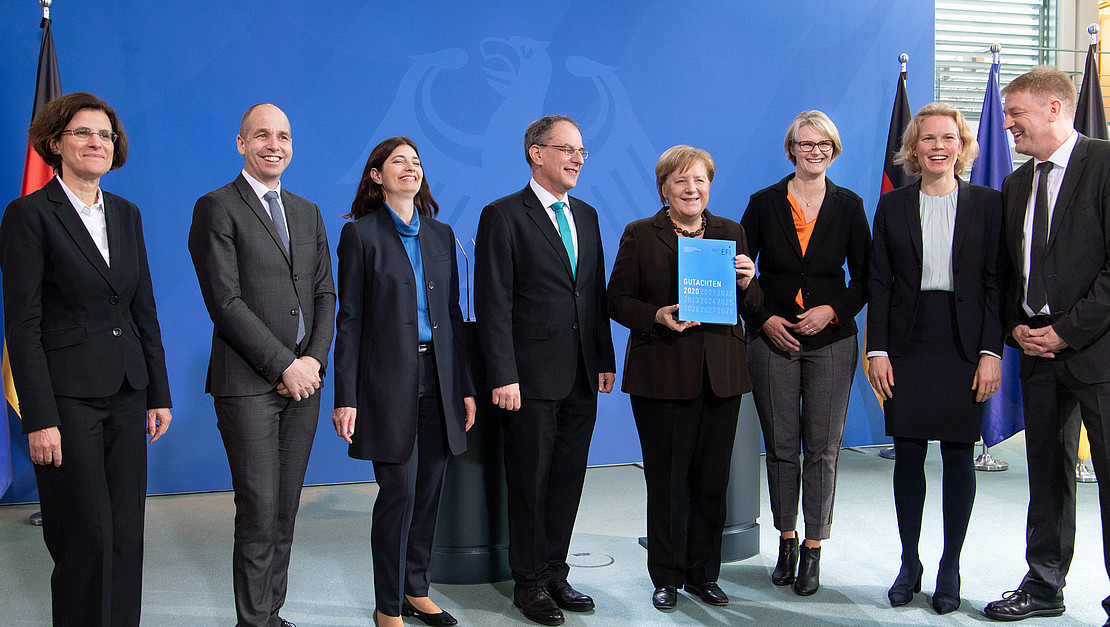This page contains automatically translated content.
Expert Commission Criticizes Lack of China Expertise in Germany
 Image: EFI / David Ausserhofer
Image: EFI / David AusserhoferAccording to the expert commission, a productive scientific and economic exchange with China needs minds that are well acquainted with the Chinese language and culture, but also know the markets, institutional frameworks and political structures there well. "However, such comprehensive China expertise is hardly to be found in Germany so far," criticizes Prof. Dr. Holger Bonin, Professor of Economics with a focus on "Labor Markets and Social Security" at the University of Kassel. He is also director at the Research Institute on the Future of Work (IZA) in Bonn.
The lack of China expertise affects science and business, says Prof. Bonin. However, it is often easier for large companies to overcome than for small and medium-sized enterprises and universities.
Knowledge and technology exchange with China under the microscope
The new annual report of the Expert Commission on Research and Innovation (EFI), which was handed over to the German Chancellor in Berlin today, looks at knowledge and technology exchange between Germany and China. The commission's chairman, Prof. Uwe Cantner of the University of Jena, points out that the People's Republic of China "has developed into one of the world's leading economic nations and one of Germany's most important trading partners." The Chinese government is working consistently "to strengthen the country's regional and global power position through pronounced state control. To this end, it is also pursuing the goal of acquiring technology leadership in crucial future industries in the coming years and rising to become the world's leading innovation location." Prof. Cantner added that Germany has a great interest in good cooperative relations with China, an up-and-coming innovation location. However, he said, there are concerns that Germany's scientific and economic performance could be weakened by a one-sided outflow of scientific and innovation- or security-related know-how and uneven competitive conditions.
According to the Commission, however, the concern that the takeover by Chinese investors will weaken the performance of German companies appears to be unfounded so far in view of the data. For example, an empirical study commissioned by the Commission concludes that German companies that were taken over more than 50 percent or completely by Chinese investors did not develop any differently after the takeover than companies taken over by other international investors in terms of the number of employees, sales and patent applications.
A data analysis on R&D activities conducted on behalf of the EFI shows that companies acquired by Chinese investors or with Chinese participation do not reduce their R&D expenditures and R&D personnel. Nevertheless, the Commission of Experts points out that company investments and takeovers by Chinese investors are fundamentally associated with the possibility of strategic political influence.
Commission of Experts calls for central competence center
The Commission of Experts recommends that the German government strongly advocate a level playing field for direct investment by German and Chinese companies. It also supports the BMWi's plans to examine company takeovers by foreign investors in the area of sensitive technologies more comprehensively. To this end, the technology sectors involved should first be named and clear and transparent review criteria developed. The Expert Commission also advocates the establishment of a central competence center to advise German scientists.
The competence center should also have capacities available to meet the increased information and consulting needs of SMEs in German-Chinese research projects. Research and teaching that contribute to an understanding of current political, social and economic developments in China should be strengthened. In this context, attention should be paid to teaching a good knowledge of the Chinese language. In addition, there should be an intensive and continuous exchange on the framework conditions and perspectives of scientific cooperation between Germany and China, coordinated with the European partners.
Background
The Berlin-based Expert Commission on Research and Innovation (EFI) has been providing scientific policy advice to the German government since 2008 and submits an annual report on Germany's research, innovation and technological performance. The EFI's main task is to analyze the strengths and weaknesses of the German innovation system in an international comparison and over time, and to assess the prospects for Germany as a location for research and innovation. On this basis, the EFI develops proposals for national research and innovation policy.